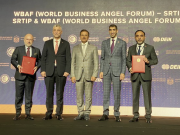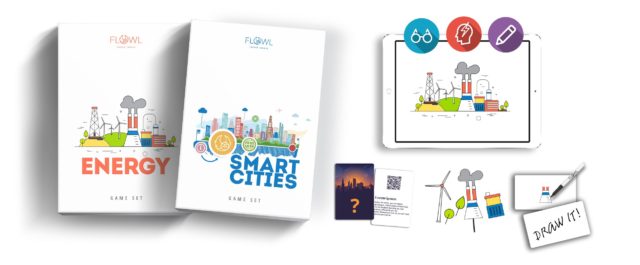 As the EdTech sector booms with opportunity and interest, so too does the technological innovation that drives it. EdTech startup, FLOWL, plans to bring their ground-breaking product to life and to market, changing the way we learn.
As the EdTech sector booms with opportunity and interest, so too does the technological innovation that drives it. EdTech startup, FLOWL, plans to bring their ground-breaking product to life and to market, changing the way we learn.
DR ISTVAN CSATARI
Co-Founder, FLOWL
Dr Istvan Csatari is an environmental scientist and research enthusiast who is passionate about developing concepts that have meaningful application within society. With over 10 years of experience working on multidisciplinary projects, Istvan has a track-record of achieving great results for academies, large corporations (including Fortune 500), startup businesses through R&D, and business presentation initiatives. He is the author of several SCI indexed publications, and co-founded FLOWL – an early-stage EdTech startup dedicated to educating and connecting generations through a unique gaming experience. Recently he settled in Turkey, and now manages his projects as a member of Istanbul University.
FLOWL ICT tool is an original patentpending creative concept model, which is dedicated to combining mobile learning environments with traditional analog (experiential) activities. Its purpose is to encourage users to deeply engage with educational content, both in a classroom and in home environments. FLOWL’s aim is to provide a well-functioning educational tool and methodology that is scientifically tested for effectiveness and reliability.
The FLOWL basic set is supplemented with educational content, instructions, and exercises integrated into a mobile application. Supplementary games (FLOWL Games) include both experiential (analog) and digital aspects. The experiential aspect of the games involves the accompanying sets of 3D Models, Play Cards, and Drawings on Mini Whiteboards.
Is EdTech the next FinTech?
EdTech is poised to be the biggest, and possibly most profitable, digitalised sector yet. The rise of a new world of education and learning has been marked by aggressive investment in the EdTech industry, set to reach USD $250bn globally by 2020.
“Despite today’s
digital advancement,
many experts have noted
the rapidly growing
popularity of traditional
analog activities.”
Enjoyable, constructivist learning environments (e.g. gamified, projectbased, problem-based), and family social processes within education are recently favoured fields of scientific research. Several articles have been published in recent years on the efforts taken towards the development of new educational methods and the evaluation of their effectiveness. Despite today’s digital advancement, many experts have noted the rapidly growing popularity of traditional analog activities.
Coding education in early ages has already adopted experiential methods. The development of similar methods for other science fields is strongly suggested by experts. Among others, compelling evidence of the commercial viability of this trend is reflected in the boom of the global board game-play cards market, which is expected to exhibit incremental growth in sales in coming years, with sales projections of USD $4.92bn by 2021.
Maker Movement is another important stream of the EdTech revolution. Prominent funding agencies support research efforts related to the Maker Movement. Making is simply defined as building or adapting objects by hand for the simple personal pleasure.
Why is FLOWL different?
FLOWL introduces a solution of how ICT could be used in future education, while also preserving traditional values and fulfilling people’s demands for analog creative pursuits and experiential learning. The team provides not only a device, but a methodology and a scientifically tested framework that could potentially gain wide adoption in the education sector.
SCIENTIFICALLY TESTED
To create a motivating experience, a goal should be in agreement with the player skill set, and should stretch a player’s existing ability. This criterion is in place to pursue a state described by as flow, which means an intense and focused concentration on one’s activity in the present moment. The algorithm used by the FLOWL Mobile Application is planned to optimize the level of challenges according to demography and real-time player performance.
Traditional methods in flow measurement rely on survey; however, the FLOWL team is expert in a newly emerging field called Social Signal Processing, where computational approaches are used for analysis of social signals during human-human or human-machine interactions. Recording a video during the game interaction makes it possible to analyze a very rich set of signals, including the facial affect, gaze and attention, body posture, interaction geometry, vocal affect, body movement-based arousal, valence estimation, and even content-based affective analysis.
Due to the truly multidisciplinary nature of the project, successful execution requires a highly qualified research consortium, which is the main reason why Dr Istvan Csatari initiated a bilateral collaboration between Istanbul University, Bogazici University (Turkey), Debrecen University (Hungary), and Szeged University (Hungary).
The consortium has been formed with the participation of 7 academics who are expected to manage the work of 13 scholars, and who are prominent contributors to their research fields; namely: Sustainable Development, Environmental Science, Instructional Design, Technology in Education, Software Engineering, Machine Learning, and the latest Social Signal Processing Technologies used for engagement evaluation. Istvan and co-founder Attila Gyori are managing the project with other non-academic team members and advisers.
The product will be positioned as an entertaining and educational game. It presents a great opportunity to bring people together in an effort to widen their knowledge, meanwhile providing them with the chance to strengthen their social connections. The team welcomes investors or sponsors for the premier game set.



























